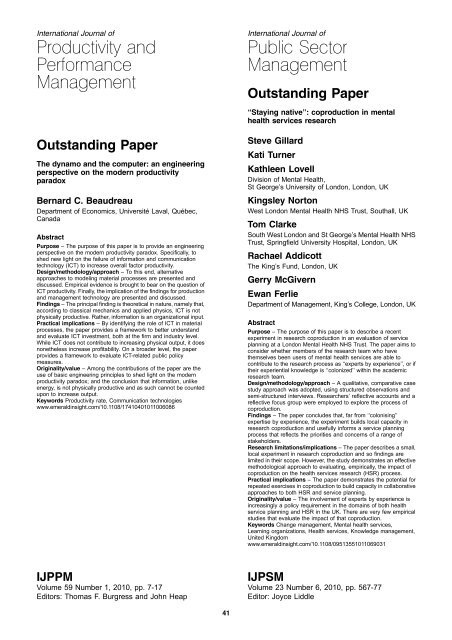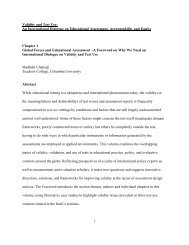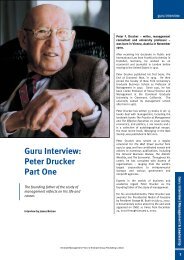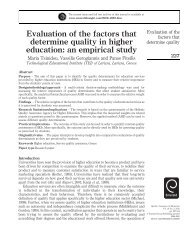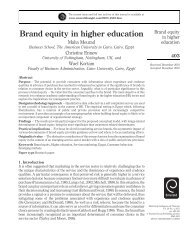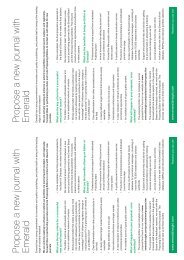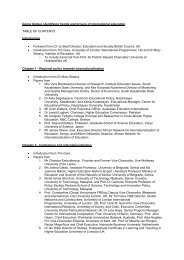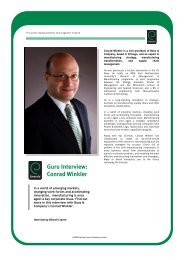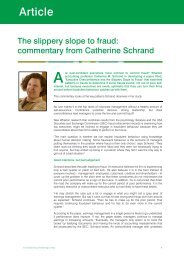Outstanding Paper - Emerald
Outstanding Paper - Emerald
Outstanding Paper - Emerald
Create successful ePaper yourself
Turn your PDF publications into a flip-book with our unique Google optimized e-Paper software.
International Journal of<br />
Productivity and<br />
Performance<br />
Management<br />
<strong>Outstanding</strong> <strong>Paper</strong><br />
The dynamo and the computer: an engineering<br />
perspective on the modern productivity<br />
paradox<br />
Bernard C. Beaudreau<br />
Department of Economics, Université Laval, Québec,<br />
Canada<br />
Abstract<br />
Purpose – The purpose of this paper is to provide an engineering<br />
perspective on the modern productivity paradox. Specifically, to<br />
shed new light on the failure of information and communication<br />
technology (ICT) to increase overall factor productivity.<br />
Design/methodology/approach – To this end, alternative<br />
approaches to modeling material processes are presented and<br />
discussed. Empirical evidence is brought to bear on the question of<br />
ICT productivity. Finally, the implication of the findings for production<br />
and management technology are presented and discussed.<br />
Findings – The principal finding is theoretical in nature, namely that,<br />
according to classical mechanics and applied physics, ICT is not<br />
physically productive. Rather, information is an organizational input.<br />
Practical implications – By identifying the role of ICT in material<br />
processes, the paper provides a framework to better understand<br />
and evaluate ICT investment, both at the firm and industry level.<br />
While ICT does not contribute to increasing physical output, it does<br />
nonetheless increase profitability. On a broader level, the paper<br />
provides a framework to evaluate ICT-related public policy<br />
measures.<br />
Originality/value – Among the contributions of the paper are the<br />
use of basic engineering principles to shed light on the modern<br />
productivity paradox; and the conclusion that information, unlike<br />
energy, is not physically productive and as such cannot be counted<br />
upon to increase output.<br />
Keywords Productivity rate, Communication technologies<br />
www.emeraldinsight.com/10.1108/17410401011006086<br />
IJPPM<br />
Volume 59 Number 1, 2010, pp. 7-17<br />
Editors: Thomas F. Burgress and John Heap<br />
41<br />
International Journal of<br />
Public Sector<br />
Management<br />
<strong>Outstanding</strong> <strong>Paper</strong><br />
‘‘Staying native’’: coproduction in mental<br />
health services research<br />
Steve Gillard<br />
Kati Turner<br />
Kathleen Lovell<br />
Division of Mental Health,<br />
St George’s University of London, London, UK<br />
Kingsley Norton<br />
West London Mental Health NHS Trust, Southall, UK<br />
Tom Clarke<br />
South West London and St George’s Mental Health NHS<br />
Trust, Springfield University Hospital, London, UK<br />
Rachael Addicott<br />
The King’s Fund, London, UK<br />
Gerry McGivern<br />
Ewan Ferlie<br />
Department of Management, King’s College, London, UK<br />
Abstract<br />
Purpose – The purpose of this paper is to describe a recent<br />
experiment in research coproduction in an evaluation of service<br />
planning at a London Mental Health NHS Trust. The paper aims to<br />
consider whether members of the research team who have<br />
themselves been users of mental health services are able to<br />
contribute to the research process as ‘‘experts by experience’’, or if<br />
their experiential knowledge is ‘‘colonized’’ within the academic<br />
research team.<br />
Design/methodology/approach – A qualitative, comparative case<br />
study approach was adopted, using structured observations and<br />
semi-structured interviews. Researchers’ reflective accounts and a<br />
reflective focus group were employed to explore the process of<br />
coproduction.<br />
Findings – The paper concludes that, far from ‘‘colonising’’<br />
expertise by experience, the experiment builds local capacity in<br />
research coproduction and usefully informs a service planning<br />
process that reflects the priorities and concerns of a range of<br />
stakeholders.<br />
Research limitations/implications – The paper describes a small,<br />
local experiment in research coproduction and so findings are<br />
limited in their scope. However, the study demonstrates an effective<br />
methodological approach to evaluating, empirically, the impact of<br />
coproduction on the health services research (HSR) process.<br />
Practical implications – The paper demonstrates the potential for<br />
repeated exercises in coproduction to build capacity in collaborative<br />
approaches to both HSR and service planning.<br />
Originality/value – The involvement of experts by experience is<br />
increasingly a policy requirement in the domains of both health<br />
service planning and HSR in the UK. There are very few empirical<br />
studies that evaluate the impact of that coproduction.<br />
Keywords Change management, Mental health services,<br />
Learning organizations, Health services, Knowledge management,<br />
United Kingdom<br />
www.emeraldinsight.com/10.1108/09513551011069031<br />
IJPSM<br />
Volume 23 Number 6, 2010, pp. 567-77<br />
Editor: Joyce Liddle


